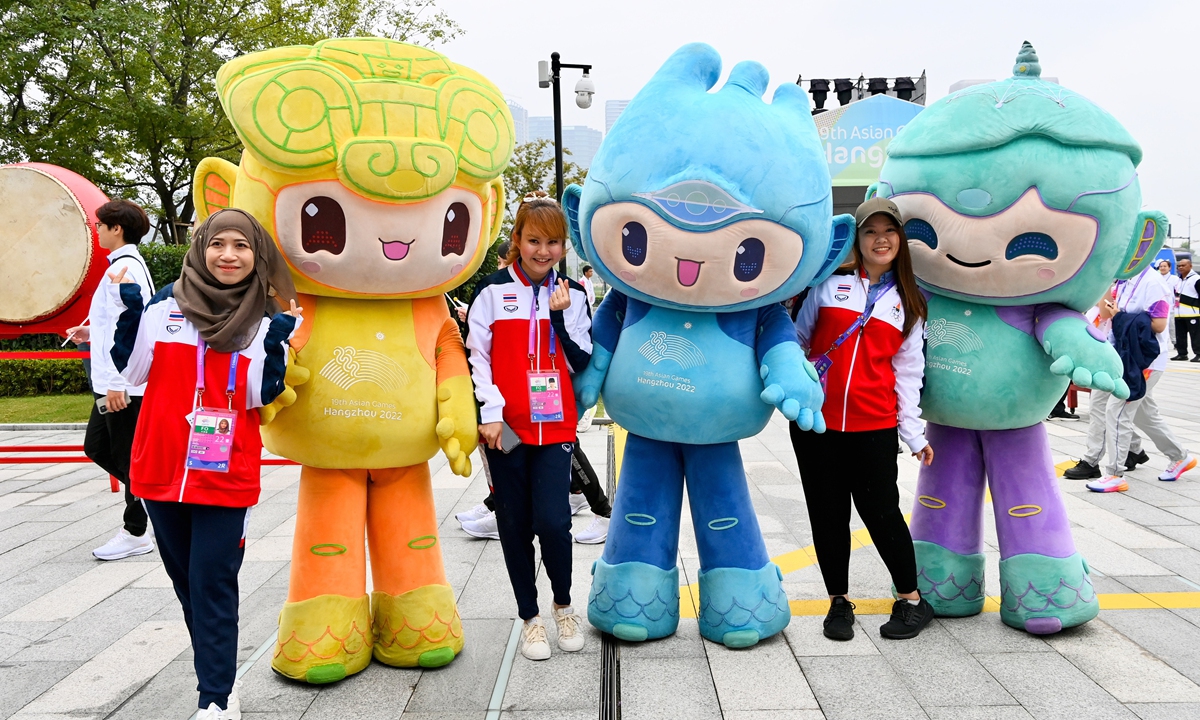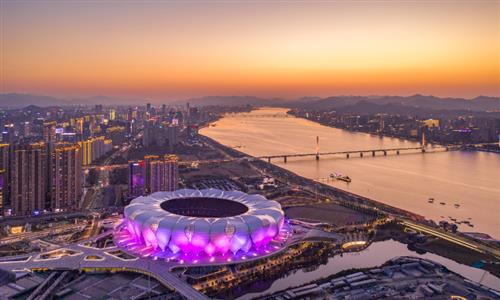
Members of the Thai delegation pose with the Hangzhou Asian Games mascot dolls at the Asian Games Athletes' Village on September 22, 2023 in Hangzhou, East China's Zhejiang Province. On the day, the organizers held a welcome ceremony for the athletes at the Athletes' Village. Photo: cnsphoto
Apart from athletes who have shown wonderful performances at the Hangzhou Asian Games, which ended on Sunday, private enterprises also delivered excellent performances before and during the events.
For example, the suppliers of rowing, canoeing and dragon boats come from Fuyang in East China's Zhejiang Province. The unique athletes' bags and other Asian Games-related souvenirs are also made in Zhejiang. The ceremonial clothing, lighting and even electric bicycles for the Hangzhou Asian Games were also made by local enterprises. The badge factories in Jinxiang township provided 80 percent of the badges for the Asian Games.
In terms of sponsors, the Hangzhou Asian Games attracted 176 corporate sponsors, with a cumulative value of 4.42 billion yuan ($610 million). A total of 107 sponsors were local companies, accounting for 60.7 percent of the total, and most of them are private enterprises, an official with the organizing committee said on Thursday during a press briefing.
For a long time, the developed private economy has been one of the economic characteristics of Zhejiang.
Analysts said that the Asian Games helped the private economy to further develop, and the economic spillover effect was obvious.
The city of Yiwu, the global commodity center, exported sports goods worth 5.08 billion yuan in the first eight months before the Games started in late September, up 33 percent year-on-year.
Hangzhou, the capital of Zhejiang, is known as the No.1 city of private enterprises in China, as it is home to 23 enterprises that are among the Fortune China 500 list, such as Alibaba and Geely Holding Group.
In 2022, the value-added of Zhejiang's private economy accounted for 67 percent of the province's GDP. There are 3.22 million private enterprises in Zhejiang, accounting for 92.05 percent of the total number of enterprises in the province.
The Asian Games has been conducive for the economic development of Zhejiang, and for private enterprises to develop in the short term. The event has also provided long-term opportunities for development, Tian Yun, a veteran economist based in Beijing, told the Global Times on Sunday.
"With the deepening of China's opening-up in the coming years, more and more international events will be held in China, and more and more foreigners will return to China, or they will visit the nation for holidays, travel and study, where private companies will find huge opportunities, not only in goods trade, but also in services trade," said Tian.
Besides, services industries boomed during the Hangzhou Asian Games. Total consumption in Hangzhou during the Golden Week was 23.753 billion yuan, and more than 13 million tourists were received.
The debut of the "Smart Hangzhou" mini-program on Alipay, serving people in 18 scenarios including tickets, food, hotels, transport, travel and shopping, was downloaded by 113 million people, according to official data.
The Asian Games is an opportunity to raise the brand value of Hangzhou and other cities in Zhejiang, which will help local enterprises attract more domestic and foreign investment and cooperation opportunities, Qi Jiafu, a veteran practitioner in the sports industry, told the Global Times.
"This trend can promote economic growth and the sustainable development of cities and industries," said Qi.
In addition, many cities in the central and western regions, such as Wuhan, Chengdu and Chongqing, are preparing to bid for international competitions. The Asian Games in Hangzhou has set an example of how to stimulate the regional economy, Tian noted.
Tian stressed that the successful holding of the Asian Games has demonstrated to people around the world China's determination to re-open and further integrate into the global economy after the end of the pandemic.
"When people come to China and see its development, those smears and rumors against China will fall on their own," said Tian.

